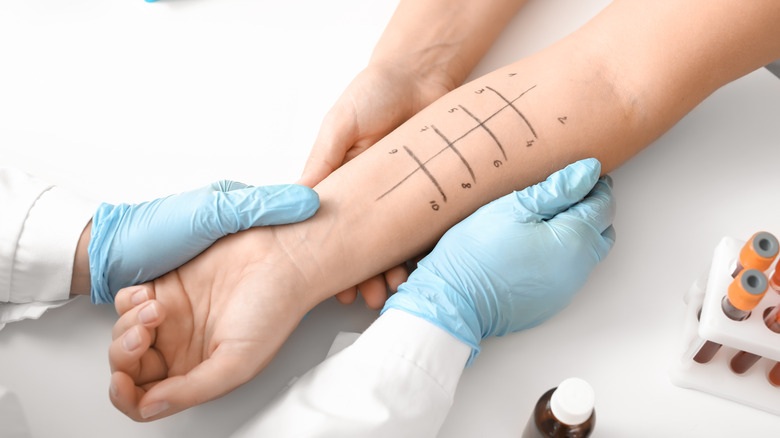Read This Before Believing That At-Home Food Sensitivity Test
Because of how prohibitive visiting a specialist can seem, at-home tests for food allergies and sensitivities have multiplied into a market. The promise that a quick sampling of one's blood or hair would tell you how to improve your life is a powerful pitch. However, you should still consult a specialist.
This was brought into focus by the "Today" show when NBC's Vicky Ngyuen tried three at-home food sensitivity tests. One was made by Everlywell, one by 5 Strands, and one by Ucari. Respectively, they cost $127, $88, and between $69 and $99. They gave results that ranged across the entire food spectrum.
Part of the issue is that the tests do not rely on a scientifically proven method. Everlywell measures IgG levels in your blood. But, as the American Academy of Allergy, Asthma, and Immunology (AAAAI) writes, the presence of raised lgG is normal when food is introduced into the bloodstream.
The other two tests rely on bioresonance, which essentially means that they compare the frequency of your hair to that of certain foods. The concept is used in alternative medicine and the AAAAI told "Today" that there was no scientific evidence for this working either. 5 Strands suggested in a statement that this was because bioresonance was not taught in medical schools, meaning doctors might not be familiar with the evidence.
It's quicker just to go to the doctor
If the lack of scientific backing is not enough to convince you to go to a specialist instead, the fact that there is no backing also means that taking an at-home food sensitivity test will just prove an inconvenience.
As GoodRX Health notes, you will have to pay for a test and then in all likelihood, have to take a test when you visit the specialist anyway. Everlywell, for example, told "Today" that it encourages patients to share the results of their test with a specialist. However, as the licensed dietician Tamara Duker Freuman wrote in a piece for Self, a specialist would rather you not take a test before seeing them. That's because they have to dispel any notions that the test had given the patient. The best case scenarios are those in which the patient listens. Even then, though, it takes time and the patient is understandably aggravated by having spent money and effort for a result that is wrong.
Worst case scenarios involve patients who bought into the results of food sensitivity tests entirely. "I've watched helplessly as my patient disappears down a rabbit hole of food restriction and avoidance that can, for some people, lead to disordered eating," Freuman shared, describing how patients assume they just need to eliminate more food from their diet. Before taking your blood and pulling out your hair, you should see someone with the expertise to address any gastrointestinal distresses you're facing.

